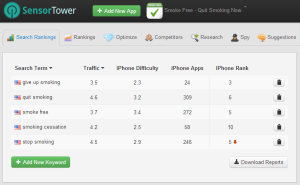I’ve built a stop smoking app that’s being downloaded a fair bit (over 10k times a month at present). Given most of this traffic comes from the UK and only 10% from the US it’s reasonable to think there’s more people we could reach.
I won’t deny that vanity is one of the factors driving this desire, but it’s not the main one. Beneath the app is an experiment that seeks to test the efficacy of different behaviour change techniques on this, one of the most challenging of habits to break. More users means more data and more data allows us to determine not just which behaviour change techniques work but for whom in particular and when.
So why isn’t the app being downloaded in the US? The reviews in the UK store are great so its seems people like the thing. It also appears high in the search results for terms such as ‘stop smoking’, ‘smoking cessation’, ‘quit smoking’, ‘give up smoking’ and ‘smoke free’. Or at least it does when I search.
I don’t know much about what makes people choose a particular app but I do know that search is key. Apple restricts descriptive keywords to 100 characters and also weighs terms in the title more heavily. Therefore, it’s important to choose the right keywords carefully.
 A tool I’ve been using to help is SensorTower (others are available). I’m on the free service and get the ability to check where my app appears for five sets of keywords in one country’s iTunes Store. I also get a sense of the traffic those keywords receive, their difficulty of appearing high in the results and how many other apps are returned when they’re entered.
A tool I’ve been using to help is SensorTower (others are available). I’m on the free service and get the ability to check where my app appears for five sets of keywords in one country’s iTunes Store. I also get a sense of the traffic those keywords receive, their difficulty of appearing high in the results and how many other apps are returned when they’re entered.
There are other features (I believe many of them free), though I’ve only really used the search ranking one. It did work though. I saw that US smokers use the term ‘quit smoking’ more frequently and so changed the title of the app. Now when it’s entered mine appears in position 6, up from 54. This position can change of course but you get notifications whenever that happens (an email I simultaneously look forward to and dread).
My US users aren’t growing through the roof, but they are growing and I think the longer the app stays in those kinds of positions the more the traffic should increase.
I should point out that one of the reasons I’m writing this blog is because SensorTower are offering access to their paid-for services in return for a blog about them. However, they were clear they wanted honest reviews and I’ve not felt obligated to praise them. In that spirit I’d like to say I think their starter prices too high for small developers and would urge them to do more to accommodate the kinds of people who could most benefit from their service. I’ve just started a PhD in technology and behaviour change and have found a large number of people working hard to create evidence-based health apps. There’s a huge need for apps that deliver good information but people searching for them have to wade through a load of apps that aren’t up to scratch. Problem is that most researchers operate under tight budgets and will probably find the fee just shy of $500 a year to be prohibitive.
Apart from that I really like their service and have genuinely found it useful. I also liked the email I got from one of the founders ten minutes after signing up. It could have been an auto-response but it seemed personal and it was probably the single reason I spent some time on this software rather than sticking it in the pile of things to do later.

Recent Comments